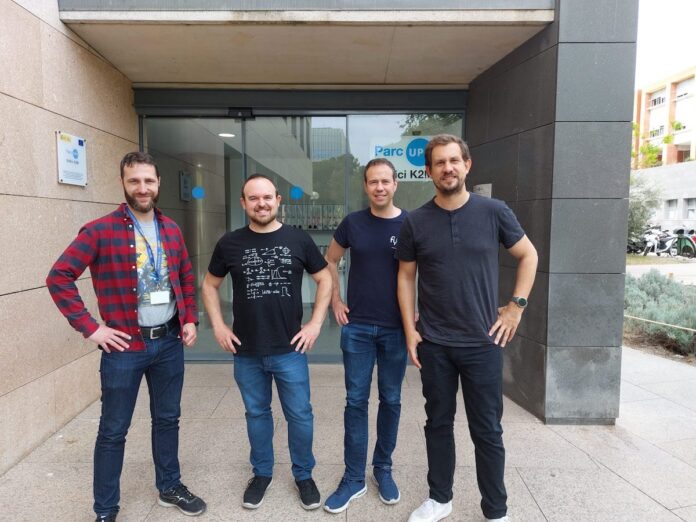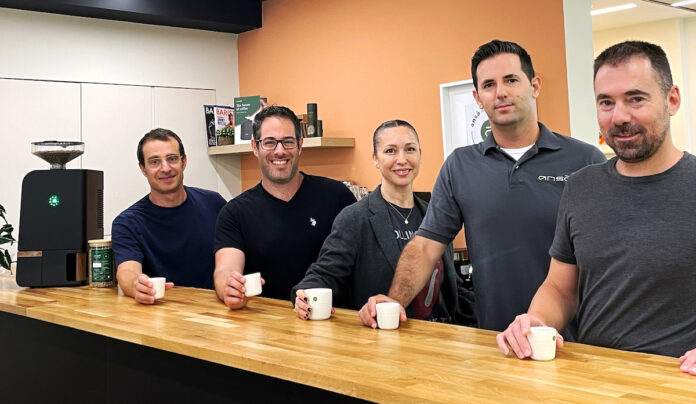Trailblazer Zakaria Jaiathe Revolutionizes Cross-Continental Trade with Waanda Startup
Please introduce yourself and your startup Waanda to our readers!
In the dynamic world of entrepreneurship and technology, Zakaria Jaiathe has emerged as a trailblazer, leading the charge in revolutionizing cross-continental business interactions. At the helm of the groundbreaking startup Waanda, Jaiathe has orchestrated a transformational platform that is redefining the way African SME producers connect with European retailers.
Zakaria Jaiathe’s journey is one of resilience, innovation, and a deep-rooted passion for leveraging technology to drive social and economic change. With a solid academic foundation, holding dual master’s degrees in computer software engineering from Bordeaux INP and ENSIMAG, Jaiathe combines academic excellence with a hands-on approach to business. His experience as a software engineer and technology executive advisor at SAP, a global technology giant, further honed his skills and insights in information systems engineering, lean startup methodologies, and project management.
Waanda, the brainchild of Zakaria Jaiathe, is a transformative SaaS-enabled B2B marketplace that serves as a conduit between African SME producers and European retailers. The platform’s innovative approach breaks down geographical barriers, enabling seamless trade and collaboration across continents. In just over 1.5 years, Jaiathe has propelled Waanda to remarkable heights, with over 1000 users spanning 10 countries.
Under Zakaria Jaiathe’s leadership, Waanda has not only disrupted traditional business models but also forged impactful partnerships and secured multiple funding rounds. These achievements underscore Jaiathe’s ability to cultivate collaboration and garner resources to fuel the platform’s growth. With an unwavering commitment to empowering African SMEs and expanding opportunities for European retailers, Jaiathe’s vision is resonating with investors and partners alike.
How did you get the idea of Waanda?
Startup ideas often arise from identifying gaps in the market, solving existing problems, or combining different concepts in innovative ways. In the case of Waanda, it seems that Zakaria Jaiathe’s idea emerged from his background in technology, retail, and logistics, coupled with his deep desire to contribute to Africa’s development. His exposure to the African community during his time at SAP, coupled with his involvement in the African think tank, likely played a significant role in sparking his vision.
Inspiration can come from various sources, such as observing successful models like Alibaba, Faire, Ankorstore, and Orderchamp. Reading books, attending masterclasses, and studying these platforms may have given Zakaria a foundation to understand the mechanics of B2B retail
and how they could be adapted to the unique context of connecting African SME producers with European retailers.
Over time, as Zakaria’s experiences and knowledge converged, he likely started envisioning a platform that could digitally transform the export of retail goods from Africa to Europe. Through continuous refinement, feedback, and strategic thinking, his initial idea would have evolved into the comprehensive concept that Waanda represents today.
It’s important to note that the process of ideation is often dynamic and nonlinear. Ideas can be shaped by personal experiences, industry trends, technological advancements, and a deep commitment to making a positive impact.
Why did you decide to start with Waanda?
Zakaria Jaiathe’s decision to start Waanda likely stemmed from a combination of his personal passions, expertise, and a clear understanding of the market’s needs. While I don’t have access to his personal thoughts, I can offer some insights into why he might have chosen to pursue Waanda as his entrepreneurial venture:
Passion for Africa’s Development: Zakaria’s desire to contribute to Africa’s development was a driving force in his career. His involvement in the African think tank and his dedication to empowering the continent’s businesses and economies could have motivated him to create a platform that directly addresses challenges faced by African SME producers.
Market Gap: Identifying a gap in the market is a common starting point for many entrepreneurs. Zakaria likely recognized that there was a lack of efficient and streamlined platforms connecting African SME producers with European retailers. This gap presented an opportunity to create value by bridging this connection and enabling cross-continental trade.
Expertise: Zakaria’s background in technology, retail, and logistics provided him with a unique skill set to tackle the challenges involved in building a platform like Waanda. His experience in these areas likely gave him insights into the complexities of supply chain management, digitalization, and cross-border trade.
Inspiration from Successful Models: As mentioned before, Zakaria drew inspiration from successful B2B retail platforms like Alibaba, Faire, Ankorstore, and Orderchamp. These platforms demonstrated the potential of connecting suppliers and retailers in innovative ways, which could have fueled his desire to create a similar model tailored to the African-European trade context.
Networking and Partnerships: His involvement in the African think tank and his interactions with other Afro Diaspora influencers and leaders might have exposed him to various perspectives and ideas. Collaborating with like-minded individuals could have inspired and validated his vision for Waanda.
Personal Growth and Impact: Entrepreneurs often have a strong desire to make a meaningful impact on the world. Building a platform like Waanda aligns with Zakaria’s mission to leverage technology for social and economic change, providing a platform that could potentially uplift countless businesses and communities.
What is the vision behind Waanda?
Waanda’s vision is to facilitate and digitize trade between African producers and European business buyers. The company aims to bridge the gap between African SME producers who often face challenges in reaching the global market and European retailers who are seeking unique products with high margins. By creating a B2B wholesale marketplace and a digital ecosystem that connects these two segments, Waanda envisions empowering African producers to access global markets and European retailers to discover and source authentic products. Ultimately, Waanda’s vision is to contribute to the economic growth of African SME producers, improve the lives of families, and foster sustainable trade relationships that benefit both continents.
How difficult was the start and which challenges you had to overcome?
The initial stages of starting a company like Waanda would likely have posed various challenges, as is common in any entrepreneurial venture. While I don’t have access to specific details about Waanda’s journey, here are some general challenges that startups in the B2B marketplace and cross-continental trade space might face, along with potential difficulties Waanda could have encountered:
Market Entry and Adoption: Introducing a new platform to both African producers and European retailers could have been challenging due to factors like awareness, trust-building, and convincing these two distinct groups to adopt a new way of conducting business.
Two-Sided Marketplace: Establishing and balancing a two-sided marketplace (producers and retailers) requires careful management to ensure that there are enough offerings for retailers to find value, while simultaneously attracting producers to list their products.
Cultural and Business Norms: Overcoming differences in business practices, cultural expectations, and negotiation styles between African and European partners could have required adaptability and sensitivity.
Logistics and Shipping: Managing efficient and cost-effective logistics for cross-border trade could have been complex due to varying shipping regulations, customs procedures, and the challenge of ensuring timely deliveries.
Quality Control: Ensuring the quality and authenticity of products listed on the platform is crucial to maintain trust among retailers and avoid issues related to counterfeit goods.
Payment and Currency Conversion: Facilitating secure and seamless payments, especially across different currencies, while also considering financial regulations, could have been a significant hurdle.
Technology Infrastructure: Developing a robust platform that supports seamless interactions, secure transactions, and scalability while minimizing technical glitches and downtime is a common challenge for tech startups.
Regulatory and Legal Challenges: Complying with international trade regulations, data privacy laws, and business registration requirements in both African and European markets could have posed legal complexities.
Customer Acquisition and Retention: Convincing retailers to shift from traditional methods to a digital platform and retaining them as consistent users can be a gradual process, requiring effective marketing strategies.
Building Trust: Building trust among all stakeholders, including producers, retailers, and partners, is crucial for the long-term success of the platform.
Who is your target audience?
Waanda’s target audience comprises two main groups: African SME producers and European retailers. The platform aims to connect these two segments and facilitate trade between them. Here’s a breakdown of Waanda’s target audience:
African SME Producers: Waanda seeks to empower African small and medium-sized enterprises (SMEs) that produce a variety of products, which can range from crafts and fashion items to unique goods with cultural significance. These producers often face challenges in reaching global markets due to limitations in resources, access to distribution networks, and exposure. Waanda’s platform offers them an opportunity to showcase their products to a larger audience of European retailers, potentially increasing their sales and expanding their business reach.
European Retailers: The platform caters to European retailers who are on the lookout for distinctive products to offer to their customers. These retailers could include concept stores, gift shops, decor stores, and other businesses seeking to diversify their product offerings with unique, culturally-rich goods from Africa. By connecting with African producers through Waanda, European retailers gain access to a curated selection of products that align with their values and customer preferences.
Waanda’s unique value proposition lies in bridging the gap between these two groups, enabling producers to access broader markets and retailers to discover authentic products that resonate with their target customers. The platform’s digital ecosystem facilitates communication, transactions, and logistics between African producers and European retailers, ultimately benefiting both sides of the trade equation.
What is the USP of your startup?
The Unique Selling Proposition (USP) of Waanda, the B2B marketplace connecting African SME producers with European retailers, lies in its distinctive features and value that set it apart from other platforms. Here are some key aspects of Waanda’s USP:
Geographic Focus and Expertise: Waanda focuses specifically on connecting African producers with European retailers, leveraging its understanding of the unique challenges and opportunities within these markets. This specialized approach allows Waanda to tailor its services to the needs of both regions and provide effective solutions for cross-continental trade.
Curated and Unique Product Selection: Waanda differentiates itself by offering a curated selection of products from African SME producers that are not commonly found on mainstream platforms. European retailers can access unique and culturally rich goods, allowing them to stand out in their markets and cater to customers seeking distinctive offerings.
Low Minimum Order Quantities (MOQs): Waanda addresses a common challenge for retailers by offering low MOQs, allowing them to explore new products and test market demand without committing to large quantities. This flexibility encourages retailers to experiment with diverse offerings.
Free Shipping and Customs Services: By offering free shipping and customs clearance, Waanda simplifies the logistics of cross-border trade for retailers. This reduces costs and administrative burdens, making it more attractive for European retailers to source products from African producers.
Social Impact: Waanda’s commitment to making a positive impact on Africa’s economic growth is a powerful selling point. By providing a platform for African SME producers, Waanda supports job creation, sustainability, and empowerment within local communities.
Diverse Team and Expertise: The diverse backgrounds of Waanda’s founders, including experience in marketplaces, retail, logistics, and technology, contribute to a well-rounded and capable team that understands the intricacies of both African and European markets.
Partnerships and Government Relationships: Waanda’s collaborations with governments and partnerships with organizations, such as the Moroccan government, demonstrate credibility and open doors for potential support and recognition.
E-commerce Solutions for African Producers: Waanda goes beyond being just a marketplace by providing African producers with ERP/CRM mobile apps that help them manage their businesses more efficiently, enhancing their overall trading experience.
In summary, Waanda’s USP lies in its specialized focus on facilitating trade between African SME producers and European retailers, offering a curated product selection, low MOQs, free shipping and customs services, a commitment to social impact, and a well-equipped team with expertise across multiple domains. These elements collectively position Waanda as a unique and valuable platform in the B2B trade ecosystem.
Can you describe your typical workday ?
7:00 AM – 8:00 AM: News and Industry Updates Zakaria starts his day by staying informed about the latest news and trends in the e-commerce and retail industry. He reads newsletters and updates from organizations like Bundesverband E-Commerce und Versandhandel Deutschland e.V. and other relevant sources to gain insights into the current state of the market.
8:00 AM – 9:00 AM: Customer Engagement and Activation During this hour, Zakaria focuses on customer-related tasks. This involves addressing customer inquiries, ensuring smooth onboarding for new customers, and resolving any issues that may arise. By prioritizing customer engagement, he aims to create a positive experience for both producers and retailers using the Waanda platform.
9:00 AM: Team Standup Meeting Zakaria leads the team standup meeting, which provides an opportunity for the entire team to come together and discuss ongoing projects, challenges, and potential solutions. This daily meeting helps foster communication, collaboration, and alignment among team members.
Morning: Administrative Tasks and Compliance The morning is dedicated to handling various administrative tasks to ensure the company’s compliance and operational efficiency. Zakaria manages tasks related to partners, service providers, tax, government regulations, and other administrative aspects that contribute to the smooth functioning of the company.
Afternoon: Strategic Focus and Growth Initiatives In the afternoon, Zakaria’s focus shifts to strategic initiatives aimed at driving the company’s growth. Depending on the goals for the week and month, he might engage in activities such as sales efforts to acquire new retailers, business development to explore partnerships, or fundraising to secure financial resources.
Continuous Focus on Financial Health As the CEO, Zakaria’s ongoing priority is to ensure the financial health and sustainability of the company. He monitors the company’s financial situation, explores avenues for revenue generation, and strategizes to secure funding that supports Waanda’s growth and expansion.
Where do you see yourself and your startup Waanda in five years?
In five years, Zakaria Jaiathe and the startup Waanda could have achieved significant growth and impact in the B2B marketplace space that connects African SME producers with European retailers. Here’s a potential vision for where Zakaria and Waanda might be in five years:
Expanded Global Presence: Waanda could have expanded its reach beyond the initial 10 countries to include a broader network of African SME producers and European retailers. The platform might have established a strong presence in additional African regions, connecting more producers with retailers globally.
Increased User Base: Waanda’s user base could have grown substantially, with a larger number of both African producers and European retailers using the platform to trade goods. The platform’s success in simplifying cross-continental trade might have attracted a diverse range of users seeking unique and culturally rich products.
Diverse Product Catalog: The product catalog on Waanda could have become even more diverse and extensive, offering a wide range of products from African producers. This could include not only traditional crafts but also innovative and modern goods that cater to changing consumer preferences.
Enhanced Technology Solutions: Waanda’s technology solutions might have evolved to provide even more streamlined and efficient processes for producers and retailers. The platform could offer advanced tools for inventory management, order tracking, and customization, making it easier for businesses to trade across borders.
Stronger Social Impact: Waanda’s commitment to creating social impact could have made a tangible difference in the lives of African producers and their communities. By facilitating trade and generating income opportunities, Waanda might have contributed to job creation, empowerment, and improved living standards.
Collaborations and Partnerships: Waanda could have forged collaborations and partnerships with a wider range of organizations, governments, and industry stakeholders. These partnerships might amplify the platform’s reach, enhance its credibility, and provide additional resources for expansion.
Financial Sustainability: With a successful track record and a growing user base, Waanda might have achieved a higher level of financial sustainability. The platform could have secured multiple funding rounds, revenue streams, and profitable operations, ensuring its continued growth and development.
Recognition and Influence: Zakaria Jaiathe and Waanda could be recognized as leaders in the B2B marketplace ecosystem, with their success story featured in media outlets and industry events. Their expertise and insights could contribute to discussions on e-commerce, cross-border trade, and economic development.
Continued Innovation: Waanda might continue to innovate and introduce new features that cater to the evolving needs of producers and retailers. These innovations could further enhance the platform’s user experience, making it a go-to destination for B2B trade.
Positive Economic Impact: Through its growth and success, Waanda could have contributed significantly to economic growth in African regions by enabling producers to access larger markets and retailers to diversify their product offerings. This positive economic impact could extend to both continents involved in the trade.
What 3 tips would you give to founders?
Embrace Challenges as Opportunities: When faced with significant challenges, don’t be quick to pivot your startup’s direction in search of an easier path. Instead, view challenges as opportunities for growth and innovation. By addressing challenges head-on, you might discover unique solutions that could become your startup’s distinguishing factor in the market.
Thoroughly Prepare Before Fundraising: Prior to initiating the fundraising process, ensure that you have all your essential materials ready. This includes a well-crafted pitch deck, a meticulously organized data room containing relevant information, investment contracts, and a carefully curated list of potential investors. Being well-prepared showcases your commitment and professionalism to potential investors.
Prioritize Exceptional Team Building: Recognize that the success of your startup heavily relies on the caliber of your team. Strive to attract and retain top talent in your industry. Don’t compromise on hiring; seek individuals who are passionate, skilled, and share your vision. Offering equity to team members can foster a sense of ownership and motivation to contribute to the company’s growth.
Thank you Zakaria Jaiathe for the Interview
Statements of the author and the interviewee do not necessarily represent the editors and the publisher opinion again.




















